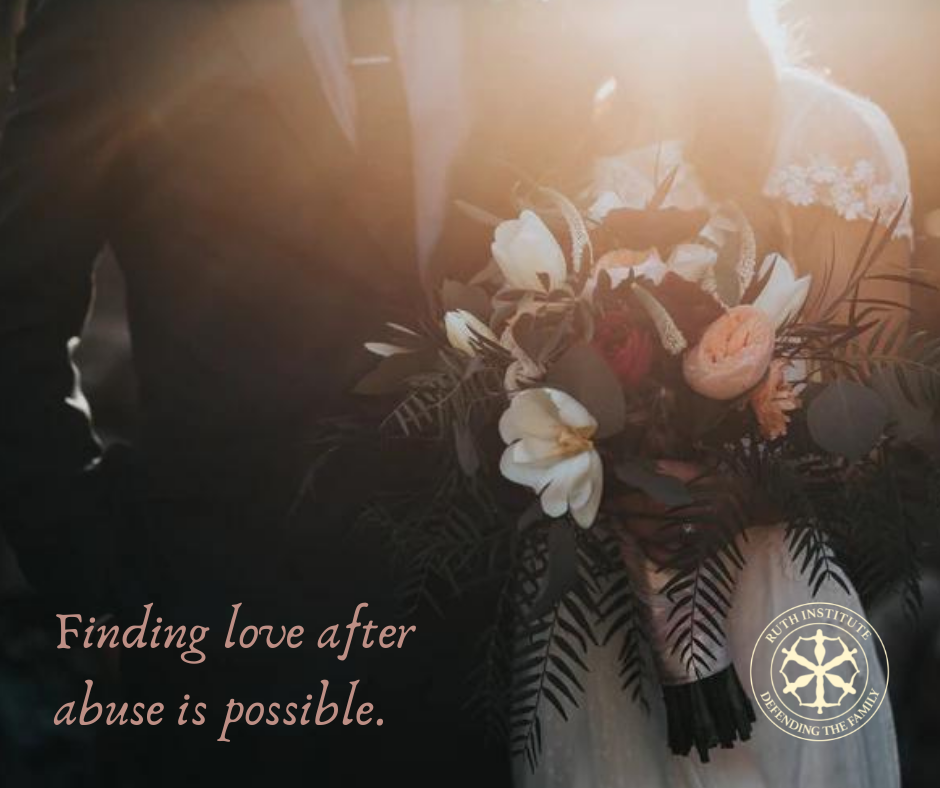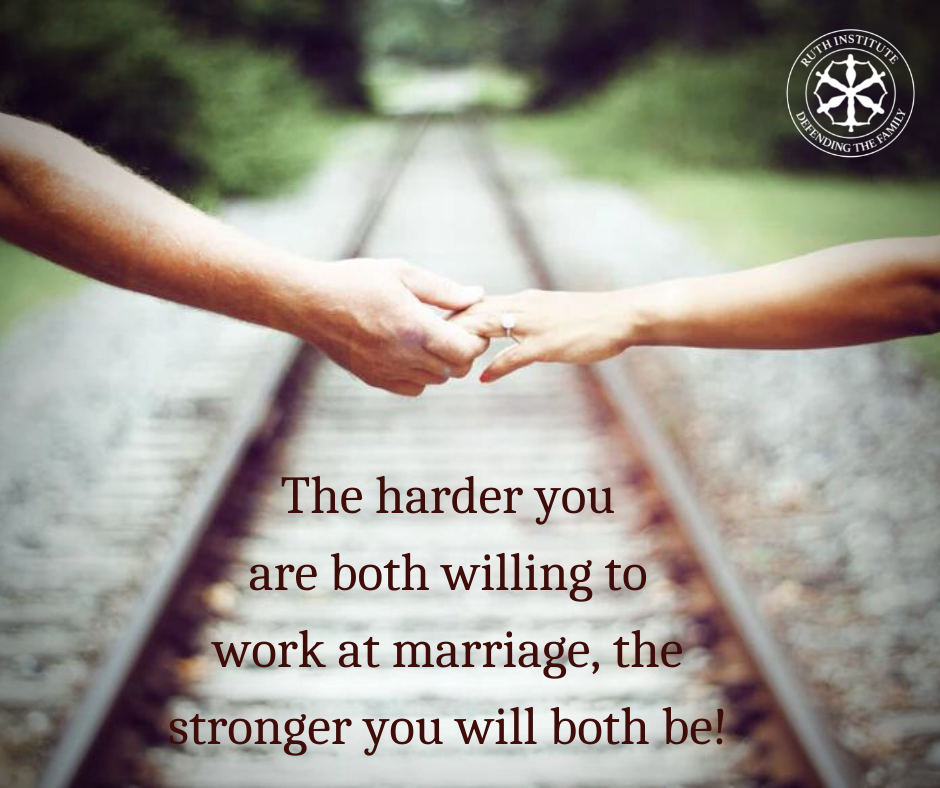This is part four of my four-part blog series on relationships after sexual abuse. So far, I have addressed revictimization, forming healthy relationships after abuse, and pursuing someone with a traumatic past. This post will be discussing marriage after abuse, some of the challenges couples face, and how couples can work together to help one another carry the cross of trauma.
No marriage can be classified as “easy” but marriage for sexual abuse survivors and their spouses can present additional challenges.
When you have been humiliated and experienced betrayal, opening your heart to someone in the most intimate way possible takes an incredible amount of strength and courage. It also takes time. However, finding love after abuse is possible. The road will be difficult and different for each couple and healing is different for everyone. However, the two of you can do it together.

If you are a survivor, you might struggle with feeling that you are not enough, that you are not worthy of being loved, or of being happy. It’s easy to become closed off to your spouse as a result. You might get easily suspicious or doubt the intentions of your spouse. It can be difficult to believe that anyone could be sincere in wanting a relationship with you.
From one survivor to another, I want you to know that you are not “damaged goods.” You are deserving of love. You are deserving of all of the gifts that come from a loving marriage. This can be so hard to accept because of the self-blame and shame, but it’s the truth! Taking on someone else’s crosses is no easy task and it absolutely takes someone special to enter into the healing process with another human being. Yet, it is possible! If a person is “the one” meant for you, they will be willing to work with you and become a part of your journey.
Beginning a new life in the sacred institution of marriage is no easy task after being hurt so horribly. There is a lot to process, a lot to consider beforehand, and a lot to work through. Keep in mind, however, that the issues that need to be worked through go beyond just the physical aspect that comes with marriage. While the marital act can be a huge trigger for a survivor, it is not the only trigger. All the same, sexual intimacy can be extremely difficult. This is just one of the hurdles a survivor needs to be willing to accept and work through both before marriage and during. Also, a husband and wife need to be willing to work on this issue together.
You can both work towards developing the skills and tools you need to contend with whatever issues that present themselves. Your marriage may not be the “normal” relationship we all crave (the kind with no horrific or traumatic pasts involved). By working together, you can find their own normal as a team. Together, you can choose to share one another’s crosses (and joys). Over time, you will both be able to see the beauty in suffering and allow it to strengthen your marriage.
I can tell you from experience that building a marriage after abuse is hard. For me, it required a lot of prayer, a lot of counseling (from a good, reputable therapist), and a long, difficult process of accepting my trauma. I needed to accept my past trauma and everything that came with it and so did my husband. I needed to figure out what my own unique triggers were and then be willing to communicate with my husband about them. He had to find ways to help me work through those triggers whenever he could. The process was painful and mighty uncomfortable at times. Over time, however, my husband became a powerful partner in my healing. At the same time, I had to learn to not rely on him every time I was having a bad moment or dealing with a trigger. I had to learn how to navigate out in the real world on my own beforehand.
I promise you that it’s worth it!

Here are some marriage tips for a couple contending with a traumatic past. Of course, these tips can go both ways especially if both spouses are trauma survivors.
For the survivor:
-Communicating is key. Help your spouse understand what you are going through. While the task of teaching them everything about trauma should not fall into your lap, you do need to be prepared to address your triggers. You also need to help your spouse to learn and understand what works for you without making them feel guilty if they don’t “get” it right off the bat. You cannot possibly expect anyone to immediately understand every emotion, trigger, and response (especially if you are newly married). You have to be patient with them as they learn. Eventually, your spouse will catch on and maybe even be able to anticipate things ahead of time.
-Continue to heal independently. Just because you now have a partner doesn’t mean that you should be relying on them for everything. It would be unhealthy to rely solely on your husband or wife every time you are (for example) having a bad day or contending with a trigger. Some self-reliance is necessary. For example, when I was working in the psychology field outside the home, I was frequently in situations that required me to stay level-headed in the present moment. I was, after all, working with troubled children and their families. I couldn’t allow my own past to interfere with whatever they were going through. Believe me, it wasn’t easy trying to help others when I was sometimes screaming on the inside. In those moments, I had to rely on self-regulation techniques and other tips and tricks I had learned in therapy. I could not rely on my husband.
-Be careful about turning your marriage into something that is all about you and your past traumas. Not to take away from your suffering, but the reality is that everyone suffers in one way or another. Be sure you are present for your spouse and resist the urge to fall into the comparison trap. In other words, don’t develop the mindset of, “I suffered worse than you did,” and therefore make your spouse feel guilty when they’re having a bad day. By marrying someone you are agreeing to take on their burdens as well. Your spouse also deserves respect, compassion, understanding, and empathy. There have been many occasions when my husband has been suffering due to some pressing issue and I have had to put my own issues aside for the present time in order to help him. Marriage means giving 100% of what you are able to give at any given moment. Sacrifice is required!
For the spouse of the survivor:
-Do your research and educate yourself (especially if you haven’t already done so). Don’t rely solely on your spouse for help and advice on how to deal with their burdens. A survivor can help guide you and help you understand how to address their own personal triggers, but you should still be seeking out professional help if necessary. You need support too. Even though your spouse bears the brunt of the pain, watching a loved one suffer is traumatic in and of itself.
-Ask questions when you need to but don’t rely solely on your spouse for answers regarding trauma. Talk to a trusted mental health professional, priest, counselor, or someone from your loved one’s support system. My husband, for example, often spoke with my parents, therapist, or with other survivors we knew and trusted.
-Practice good self-care. If you’re not at your best emotionally, physically, and spiritually, how can you expect to be the best help for your husband or wife?
-Resist the urge to try to “fix” everything. Plain and simple, you can’t and you won’t. Men especially tend to have an innate desire to fix problems. My own husband certainly struggled with this especially in the beginning. He had to humble himself enough to realize that he wasn’t some sort of savior and there was no one thing he could say or do that was going to make all of my pain disappear.

One of the greatest pieces of advice my husband received before our own wedding came from a male survivor of clergy sexual abuse. He reminded my husband that I needed to be allowed to be upset by normal, everyday things (such as illness, bad weather, grouchy kids, dirty dishes, etc). Not every single one of my negative emotions or bad days should be automatically attributed to the traumas I had suffered. This very wise survivor reminded my husband that I still had normal, everyday feelings. I needed to learn how to be upset about those normal things and also accept that it was completely okay to feel upset by them. Everything didn’t have to be about the past sexual abuse.
Validate whatever your spouse is going through no matter how insignificant it may seem. Reassure them that it’s okay and normal for them to be upset about things other than the serious trauma.
This advice has truly been life-changing in my own marriage. While my rape is a big part of my history, it is not all that I am. This was something I had to learn as did my husband. Let’s face it, reading one another isn’t always easy for a couple especially in the beginning of a marriage. There was a time before we received that advice when my husband was really was starting to assume that every bad moment/day was due to my past trauma. Yet, this wasn’t true.
I was surprised to realize that I needed a lot of help adjusting to normal life and to the normal everyday ups and downs. Not every frustration, every twinge of anger, and every tear was due to the abuse. I needed to learn to “allow” myself to be annoyed about those little, everyday things. This may sound strange, but a survivor has the daunting task of relearning how to function as a “normal” human being all over again, complete with normal, everyday human emotions. It’s easy to become used to being overwhelmed by the really big things, the things that really shouldn’t be normal for everyone. Sexual abuse is not normal. Thankfully, my husband was by my side to help reassure me that it was okay for me to be upset about issues other than trauma.
In the end, a strong marriage is based on unconditional love, dedication to one another, willingness to put in the hard work and, for people of faith, putting God first in your marriage. Remember, the harder you are both willing to work at marriage, the stronger you will both be! My own marriage is still far from perfect. However, we have learned that, as long as we both pursue God and put Him at the forefront of your relationship, and as long as we are open with one another about the struggles we face, we can get through anything.

In closing, marry someone who is willing to take on your crosses (of the past, present, and future), as well as your sorrows, and your joys. Yet don’t marry someone who is going to carry you all the time. There is no person on this earth who can make all the pain and sorrow go away. You should be able and willing to help carry your spouse when they need you to. Marry someone who can encourage you and heal with you. Be willing to pray together, learn together, and grow together. Over time, and with lots of practice and patience, you will find that you have both become stronger, both as individuals and as a couple.
Do you have a question about victimization and/or healing? Email me at AskASurvivor@ruthinstitute.org. Your name and personal information will never be used in my public responses.



